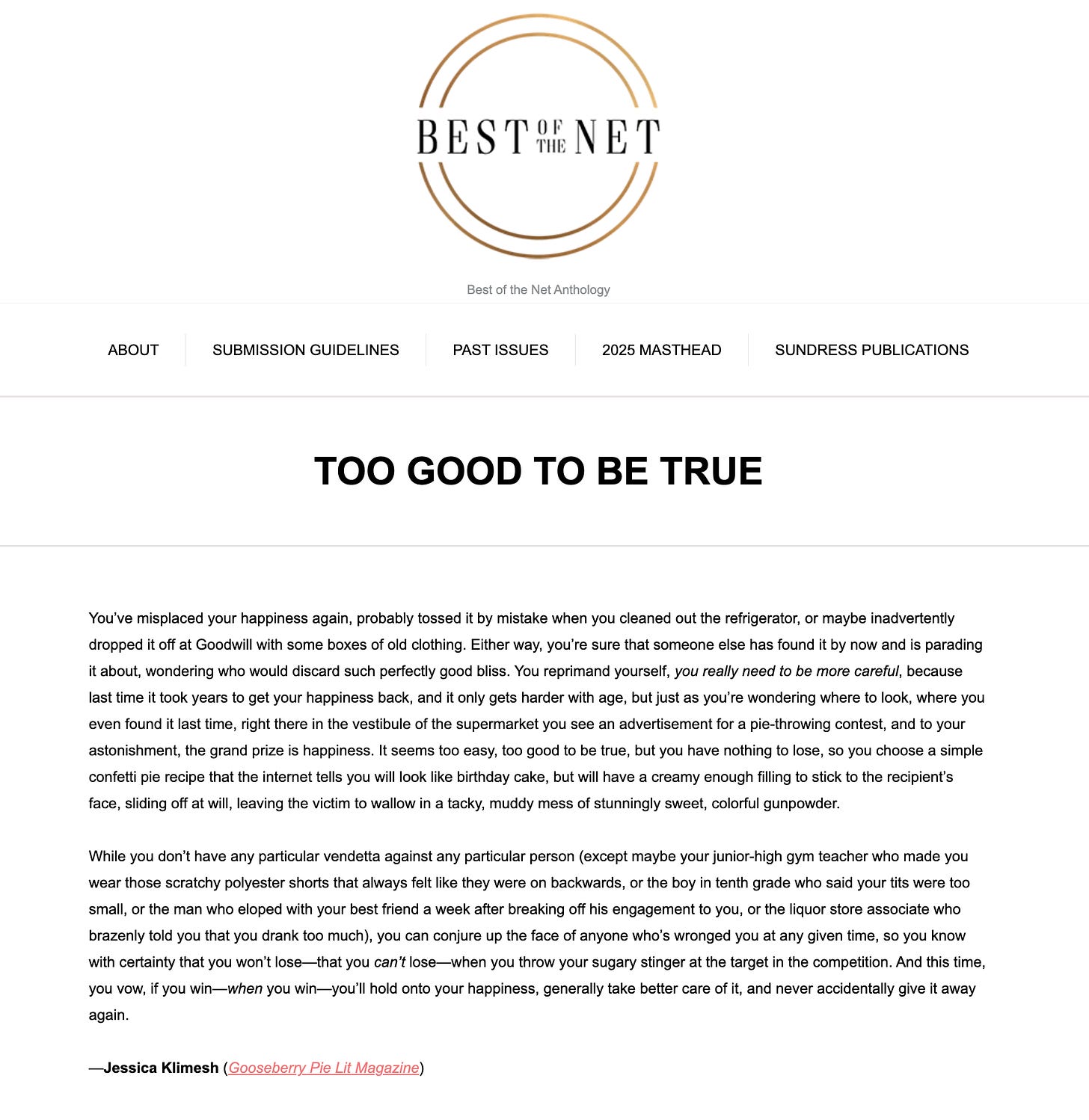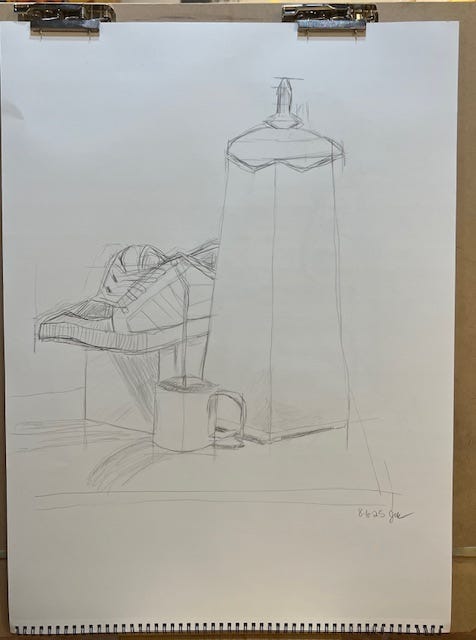Context Is Everything
Managing Perfectionism and Imposter Syndrome as Writers
Running on Empty
This past weekend, I ran a 5k, and was somewhat disappointed by the fact that I was substantially slower than when I ran the same race a year ago. Last year, I finished in 34:11 (with an average pace of 11:01), and recall that I had to walk the last half mile. This year, I was able to run the whole route—no walking—but finished in 37:56. More than three minutes slower?! (In the running world, that’s a huge difference.)
With no other context, an outsider might draw certain conclusions, one being that I must be out of shape—or at least in worse shape than last year. (For the record, neither of those things is true!)
I could take myself to task or mope about my time. I did the race with my cousin, who had only run once in the month leading up to the run (whereas I’d been running regularly). And she finished well ahead of me: 4th, in fact, in our age category (I was 9th), out of 22.
Rest assured, my disappointment was only momentary. In general, I felt very good after the run, was glad I did it, and was satisfied that I had been able to run it and finish in a relatively reasonable amount of time, even if I was slower than I’d hoped.
Why did I feel so good about such a poor time? Because I’d had a vicious bout of insomnia that had lasted a few days, and the night before the run, I’d only gotten about an hour (if that) of light sleep. And the night before that, only about four or five hours. Not ideal circumstances for doing one’s best.
Theodore Roosevelt allegedly said, “Comparison is the thief of joy.” And this is true on many different levels.
First and foremost, comparison doesn’t take into consideration context. Which, in this case, was the fact that I had essentially run the race on “empty.”
Context Is Everything
Context comes up often in the writing, editing, and coaching I do, as well as in my own peer feedback groups, because it’s a component that’s frequently missing from first drafts. Without proper context, a reader might feel lost; they might wonder why something is significant. Context can be subtle, simply hinted at, especially in flash fiction, since the stories are so compressed. But it’s still important. As they say, context is everything. It’s where meaning comes from.
Likewise, if we must measure our “success” as writers (or runners!)—and we certainly don’t have to!—then we need to do it on our own terms, dependent on our own goals and circumstances. That’s context. (I talk more about writing success in my post “Celebrating Success: Succeeding (at Writing) on Your Own Terms.”) And to be frank, “success” is a word that I don’t really care for—particularly without context—because it’s vague on its own and means different things to different people.
Comparisons and perspectives of “success” can be especially rampant on social media—in the way people present themselves. Unless you really know the person (which we often don’t on social media), we don’t know what they’ve been through, what they’re going through, and, generally, what their life experiences have been.
In other words, context.
Yet there’s such a strong human urge to compare ourselves—both to others and to our past selves. I’m not as good as them. I’m not as successful. These comparisons can lead one down a rabbit hole and affect one’s self-confidence.
Imposter Syndrome—Sounds Fake, but It’s Real!
Imposter syndrome—something that many writers (and creatives, in general) struggle with—is often borne out of comparison. We compare ourselves to others—think that they’re way ahead of us (whatever that might mean)—without recognizing what hardships and turmoil they may have faced in getting to that place—or that they may currently be facing. Perception is not reality. Thus, it’s important to contextualize.
My own struggles with imposter syndrome have often come from the doubt bestowed on me throughout my life, with people (most often my parents) regularly telling me that I couldn’t be a writer, that I wouldn’t succeed as a writer, and that I needed to focus on a more worthy field. I was a young kid when I first started receiving these messages, and though it was clear that I had a special aptitude for language arts, e.g., receiving a 100% mid-term grade in 7th-grade English (the only 100% in the class), receiving a 100% on an English assignment in 9th grade that my teacher said she’d never ever given a 100% on before, and excelling in AP English as a senior, none of this mattered.
Yet I persisted. Because one thing that has continually motivated me throughout my life is the act of proving myself, proving my worth. I will just work harder. I will show all the naysayers.
This can be a positive thing, as the nagging thoughts of “I’m not doing enough” and “What can I do to be better?” inspired me to earn two master’s degrees (that and I love learning). But it can be detrimental, too, especially if it’s paired with perfectionism. My own perfectionism was borne out of the fact that I had two perfectionist parents, and nothing I ever did was good enough growing up. (And, of course, the fact that I pursued the “wrong” field didn’t help!)
It’s a harmful mindset. But we’re all flawed beings. No one does everything perfectly, including parenting. So, we gain insight, perspective, and move on.
I now consider myself a “recovering perfectionist.” I do certainly strive to do my best, but I’ve also learned to give myself grace. I’ve learned to trust in my abilities and to trust those who believe in my abilities, which has been hard for me.
If you’ve read some of my previous posts, you know that I’m taking art lessons. And this has actually been one of the best exercises for my recovering perfectionist tendencies.
This drawing from last week, August 6th, is certainly not perfect. But I was proud of myself. And when it comes down to it, that’s all that matters—being proud of your own abilities, no matter how imperfect.
Five Tips for Handing Perfectionism and Imposter Syndrome as a Writer
I’ve had to do a lot of “unlearning” as an adult, particularly in the last ten years, to heal and to nurture a more positive mindset within myself. And I do still get into funks at times, reverting back to my teenage mindset (and, in fact, my adulthood mindset until I reached my forties), where I was so heavily influenced by others’ opinions. But I read a post on LinkedIn the other day that really drove everything home for me—why language arts are so devalued—and it perhaps also explains why they were so devalued in my family (where math and science were the only worthwhile fields). The post also gives a fantastic explanation—the best one I’ve read to date—about the problematic issues with AI in the literary arts. Read the post here.
One of the key things I’ve learned in the last decade—whether it’s running- or writing-related—or anything else, for that matter—is the idea of doing the best I can at any single point in time—with the knowledge I have at that point in time. I talk about this and other tips for handling perfectionism as a writer in my latest YouTube video below.
If you find the video helpful, I encourage you to like, comment, share, and/or subscribe to my channel. Likewise, I invite you to subscribe or upgrade your subscription to JEK Writes.
Thank you for your support!
Exciting Literary News
Coming right on the heels of the book launch for Best Microfiction 2025 (which includes my story “The Day I Went Missing”) was the news that my story “Too Good to Be True” had been selected for Best of the Net 2025! Both stories were originally published in Gooseberry Pie Lit Magazine.

But wait, there’s more! Another piece of exciting literary news is that the first issue of Hot Flash Literary, the journal I co-founded and co-edit with poet Tina Carlson, will be out soon—early September! And it’s going to be a stellar line-up of HOT flash—I can’t wait for you to read it! In the meantime, feel free to learn more by perusing the Hot Flash Literary website and/or liking/following us on Facebook.
Available for Coaching
I’m slowly transitioning my website to better reflect what I do, changing my business name from JEK Proofreading and Editing to JEK Writing Studio. Once the transition is complete and my website updated, you’ll be able to easily view and sign up for workshops, my accountability package, and writing coaching, among other things.
Until then, you may reach out to me at jessica [AT] JEKproofreadingandediting [DOT] com or through Substack messaging.
Both my writing accountability and coaching services are customized to meet your individual needs, whether you’ve already written something, are in the process of writing something, or need help getting started. And although it will be “transformed” soon, you can still learn more about me on my current website.




You are literally on the most helpful editors and writing coaches I know! I am thrilled about your rebrand! LMK if I can help with any of the marketing bits!
So true that context is everything...and that nothing stays exactly the same. I love the reminder to meet ourselves where we're at. It reminds me of this Carl Jung quote that has always stuck with me:
“Thoroughly unprepared, we take the step into the afternoon of life. Worse still, we take this step with the false presupposition that our truths and our ideals will serve us as hitherto. But we cannot live the afternoon of life according to the program of life’s morning, for what was great in the morning will be little at evening and what in the morning was true, at evening will have become a lie.”